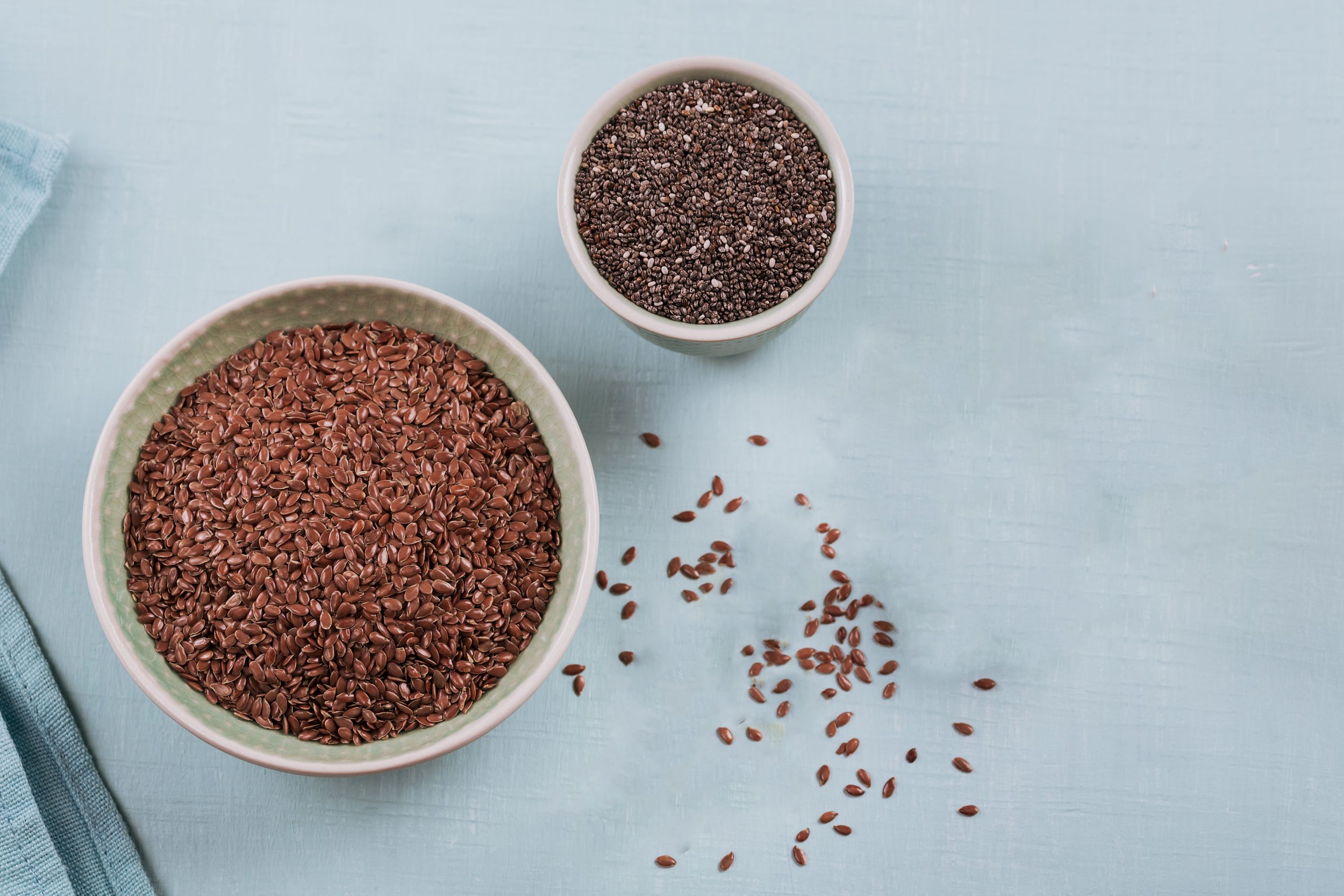What’s the Difference between Chia Seeds and Flax Seeds?
If you're looking to add a nutritional boost to your diet, you've probably heard of chia seeds and flax seeds. These tiny seeds are packed with nutrients including fiber, protein, and omega-3 fatty acids, and have gotten attention in the health and wellness world for good reason! But what sets them apart? Below are some differences between chia seeds and flax seeds, to help you make an informed choice for your dietary needs.
Here are five key points to consider when comparing chia seeds and flax seeds.
Nutritional Composition
Chia Seeds: Chia seeds are a rich source of omega-3 fatty acids, fiber, protein, and minerals like calcium, magnesium, and phosphorus. They also contain antioxidants and are low in carbohydrates.
Flax Seeds: Flax seeds are an excellent source of omega-3 fatty acids, particularly alpha-linolenic acid (ALA). They also provide dietary fiber, protein, lignans (plant compounds with antioxidant properties), and minerals such as manganese and magnesium. Flax seeds are relatively low in carbohydrates as well.
Omega-3 Fatty Acids
Chia Seeds: Chia seeds contain a higher concentration of omega-3 fatty acids than flax seeds. These essential fats are crucial for brain health, reducing inflammation, and supporting heart health. Chia seeds offer a desirable omega-3 to omega-6 fatty acid ratio, promoting a balanced diet.
Flax Seeds: Flax seeds are also an excellent source of omega-3 fatty acids, particularly ALA. However, our bodies need to convert ALA into eicosapentaenoic acid (EPA) and docosahexaenoic acid (DHA), the active forms of omega-3s found in fatty fish. This conversion process is not very efficient in some individuals.
Fiber Content
Chia Seeds: With their impressive fiber content, chia seeds can promote healthy digestion, aid in weight management, and support blood sugar regulation. When soaked in water, chia seeds form a gel-like substance that adds bulk to the stool and helps alleviate constipation.
Flax Seeds: Flax seeds are also rich in dietary fiber, which promotes regular bowel movements and helps maintain gut health. However, it's essential to consume ground flax seeds to ensure optimal nutrient absorption as whole flax seeds may pass through the digestive system undigested.
Culinary Uses
Chia Seeds: Chia seeds have a mild, nutty flavor that compliments a variety of dishes. They can be sprinkled over cereals, yogurt, or salads, used as a thickening agent in smoothies and puddings, or even added to baked goods for an extra nutritional boost.
Flax Seeds: Flax seeds have a slightly earthy and nutty taste. They can be ground and used as an egg substitute in vegan baking, added to smoothies, yogurt, or oatmeal, or incorporated into homemade granola bars and energy bites.
Shelf Life and Storage
Chia Seeds: Due to their high antioxidant content, chia seeds have a longer shelf life compared to flax seeds. They can be stored at room temperature in an airtight container for up to two years, making them a convenient pantry staple.
Flax Seeds: Flax seeds have a shorter shelf life and are more susceptible to rancidity due to their higher fat content. It's best to store them in airtight containers in the refrigerator or freezer to maintain their freshness and extend their shelf life.
Want to add these nutritional powerhouses to your diet? Here are some of our favorite ways.
Add chia seeds or flaxseeds to your oatmeal, yogurt, or smoothies.
Sprinkle chia seeds or flax seeds on top of salads or vegetables.
Use chia seeds or flax seeds as an egg substitute in baking.
* Talk to your doctor before adding chia seeds or flaxseeds to your diet if you have any health concerns.
Want to up your nutrition game?
Join the Nutrition Activity Group in the Team RWB Member App and connect with service members from all branches and eras. They share recipes, tips, and information. They also provide support as you work to achieve your fitness goals.
Sources:
Bob’s Red Mill. “Chia Seeds vs. Flax Seeds.” Available here.
Livingston, Mercey. “Chia Seeds Versus Flax Seeds: What’s the Big Difference? Well + Good. Available here.
Marengo, Katherine. “Chia Seeds vs. Flax Seeds: Is One Healthier than the Other?” Heathline. Available here.
Warwick, Kathy. “What to know about chia and flax seeds.” Medical News Today. Available here.


